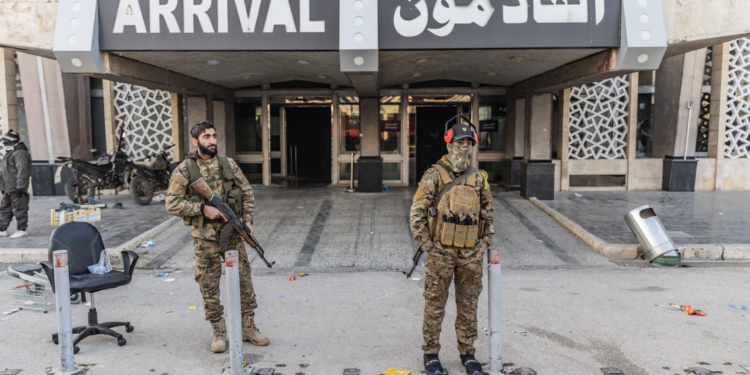Mahmoud Abbas seems willing to work with the incoming administration, but will his final legacy be one of diplomatic success, or will he be forced to return to his only remaining tool of “political resistance”?
Most Palestinians remember Donald Trump’s first term as one of the bitterest periods in the last two decades. During his four years in office, he managed to stop U.S. funding to the UN Relief and Works Agency (UNRWA), close the Palestine Liberation Organization’s offices in Washington, move the U.S. embassy to Jerusalem, and declare that city the unified capital of Israel. They also viewed the administration’s “deal of the century” as biased against them—it offered to establish a Palestinian state in just 70 percent of the West Bank, leading Palestinian Authority president Mahmoud Abbas to reject the proposal outright. Above all, they likely remember this period negatively because of the Abraham Accords, which shattered the longstanding paradigm that Arab states would not normalize relations with Israel until the Palestinian issue was resolved.
When the outcome of the U.S. election was announced last month, Abbas and his Fatah movement congratulated Trump, emphasizing the Palestinian commitment to peace and expressing hope that “the U.S. under Trump’s leadership would support the legitimate aspirations of the Palestinian people.” So far, it appears that Abbas does not intend to boycott Trump as he did before, but is willing to engage constructively with his second administration instead. Indeed, Abbas has been signaling to Trump through indirect channels—Saudi Arabia, Egypt, and the president-elect’s new Middle East advisor, Lebanese American businessman Massad Boulos, whose son is married to Trump’s daughter—that he is ready to renew negotiations with Israel for a permanent solution, with the “deal of the century” a potential starting point for talks.
Abbas, who turned eighty-nine in November, has seemingly analyzed the geostrategic situation and recognized that time is working against him and the Palestinian people. He likely believes he will not live to see the establishment of a Palestinian state but desires, at the very least, to leave a legacy showing that the diplomatic path was the right one.
Furthermore, Abbas realizes that in the coming years, the Israeli government might move toward annexing large parts of the West Bank, attempting to weaken the PA and possibly even reoccupy parts of Gaza. As a result, he has no choice but to rely on Trump’s desire to engender political and economic change in the Middle East, presumably including new understandings on the Palestinian issue.
Indeed, Abbas seems to believe that Palestinians might enjoy opportunities during the next Trump administration that were not available to them in the previous one. Trump is expected to continue a key effort initiated at the end of his first term—reaching an arrangement between Israel and additional Arab states, mainly Saudi Arabia. Before the Gaza war, the chances for such an arrangement were increasing without Israel having to make concessions on the Palestinian issue, but it is now hard to see Riyadh moving toward full relations with Israel if that issue is not addressed. Abbas is hoping that Trump will ask Israel to “pay” on the Palestinian issue—in words, actions, or both—in order to advance a regional arrangement and relations with Saudi Arabia. Moreover, it is difficult to envision an Israeli prime minister, especially Binyamin Netanyahu, clashing with Trump on this issue.
Yet the situation is more complicated than Abbas may fully realize and should give him cause for concern. For one thing, he has often exaggerated what the Saudis can do for him. Although Riyadh certainly wants to see progress on the Palestinian issue, it does not seem prepared to do much to secure this objective, especially amid doubts that Trump can deliver the desired U.S.-Saudi defense treaty.
More broadly, the Middle East geopolitical landscape has changed significantly since Trump’s first term. The statements issued by the president-elect’s campaign and nascent foreign policy team indicate that he intends to support the current Israeli government’s policies, including its more extreme elements: expanding settlements and annexing territories in the West Bank; blocking aid to the PA even at the cost of collapsing the Palestinian economy; avoiding sanctions against Jewish extremist elements in the West Bank; and supporting Knesset legislation to block UNRWA activities in the West Bank and Gaza.
In addition, if a “deal of the century, version 2” is put on the table during Trump’s next term, it will likely include even less favorable terms for the Palestinians than the first version. On a recent Haaretz podcast, former Israeli ambassador Michael Oren described conversations in which Trump’s team indicated that the original peace plan needs to be changed in light of the Gaza war. And regardless of Trump’s intentions, after October 7, Israel will find it difficult to renew negotiations with the PA if the endgame is to create a Palestinian state.
In any case, until the picture becomes clearer, Abbas will likely avoid taking dramatic steps that might be perceived as directly confronting Trump. Notably, Hamas and Fatah have been holding talks in recent months aimed at establishing a committee of technocrats to manage Gaza after the war. These two movements are normally hostile to each other, but they now have a shared fear that Israel will attempt to take permanent control of northern Gaza.
Furthermore, Abbas recently declared that if he is incapacitated, Palestinian National Council head Rawhi Fattouh would take his place in an interim capacity for ninety days until general elections are held. This announcement was apparently intended in part to appease Washington, which has long pressured Abbas to take two important steps: (1) name a successor as a way of preventing conflict once he is gone, and (2) urgently initiate reforms so the PA can become an alternative to Hamas in Gaza. Yet Abbas has avoided designating a preferred successor and has chosen a temporary substitute instead—another potential point of contention between the Palestinians and the incoming Trump administration.
Conclusion
Abbas and the PA have learned lessons from President Trump’s first term and recognize that the near future may include a turning point that shapes the Middle East for years to come, thereby affecting the Palestinians’ situation. Accordingly, instead of confronting or boycotting Trump as they did during his previous term, they are attempting to engage with him and demonstrate goodwill, despite their awareness that Palestinian interests and national aspirations are not a priority for the president-elect. This mindset is compounded by the fact that Palestinian leaders were disappointed by the Biden administration, in which they had placed hopes that were largely shattered over the past year.
Recognizing the changes that have occurred since Trump’s first term, Abbas is working to minimize damage to the Palestinian cause and mobilize regional support in a way that may advance his ultimate vision—or, as noted above, allow him to leave a legacy of successful diplomacy. His main lifeline in this regard is Saudi Arabia, which is committed to the Palestinian issue and has shown this support via public declarations and funding. Abbas also seems to believe that Riyadh is central to the moves Trump wishes to make in the region—blocking Iranian and Chinese influence, forging bilateral agreements with Middle Eastern countries, and expanding Arab normalization with Israel. Trump’s outreach to the kingdom will therefore need to have some sort of Palestinian component. If Riyadh conditions further normalization talks on addressing the Palestinian issue, Abbas could succeed politically against all odds. But the extent to which the Saudis are committed to this stance remains an open question.
All parties must also take into account the possibility that failure on this front could push Abbas to take steps that are uncomfortable for Israel and the United States, such as pursuing political and legal measures on the international stage (i.e., “political resistance”), rallying Middle Eastern countries to the PA’s side in order to complicate regional deals, and cooperating with Hamas on Gaza’s future. These steps carry risks, including a further downturn in West Bank stability that would affect Palestinians and Israelis alike.
Neomi Neumann is a visiting fellow at The Washington Institute and former head of the research unit at the Israel Security Agency.


































